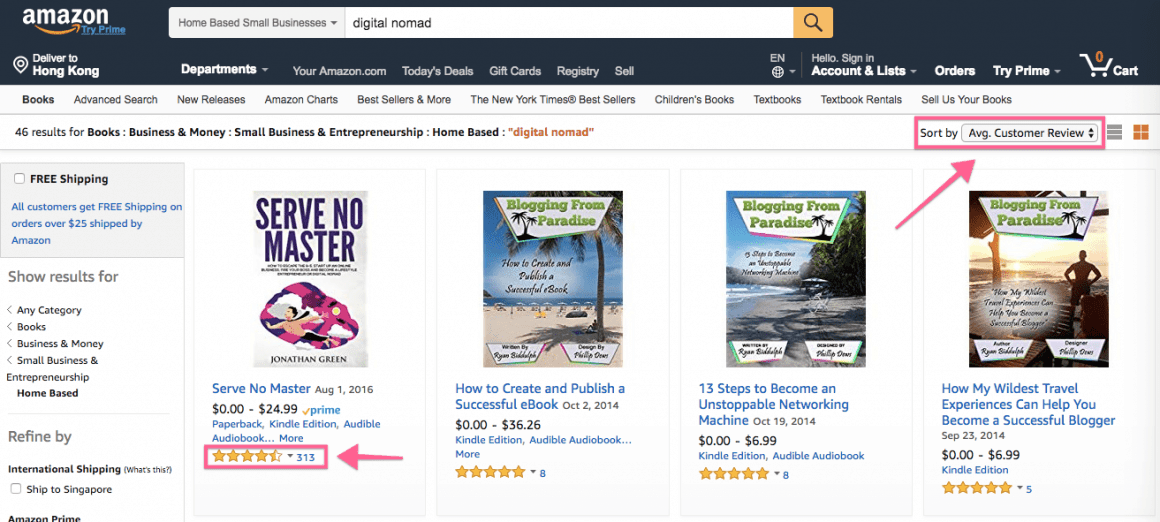

Should I start a personal blog and what should I blog about? are the two most common questions we get from readers interested in making money online.
In this article, we’ll cover:
- Is starting a blog worth it?
- Should I start a blog?
- What Should I Blog About?
We’ll take a real deep dive into what kind of blog should I start? to help you qualify your unique blog ideas using easy-to-access data from Google and other sources.

Is Starting a Blog Worth It?
For those wondering whether starting a blog is worth it; it sure is.
Play your cards right and you could be making $1,000 USD per month, or more, after a year of blogging like we did. After 2 years of work from Feb. 2017 to Feb. 2019, I stepped back from Hobo with a Laptop and proceeded to be “retired” for the following 4 years –and yet the blog was able to generate $10k, $15k, $20k per month –passively, repeatedly, and reliably. If I hadn’t taken a 4-year sabbatical, I could easily have made that $30k, $50k, or even crack $100k per month. (I try not to kick myself too much).
The first year is the toughest.
Being successful in your first year blogging comes down to a simple plan; spend the first six months creating content and spend the following six months building links and networking with other bloggers (while publishing content you created in the first six months on a drip schedule).
Then sign up for relevant affiliate programs and monetize.
That’s how we did it. If you do that and stick to one script –one idea, no ADHD flare-ups, I think it’s safe to say you’ll survive the hard part and discover for yourself that starting a blog is worth it.
Beyond monetary benefits, starting a blog is worth it for a number of other reasons, too.

Why Should I Start a Blog?
- Attract an audience
- Establish authority, validate expertise
- Build trust, rapport, and engagement
- Tell your own story
- Generate business opportunities
- Learn new things through article research
- Set yourself apart from others
- Meet new people, maybe even your own influences
- Make money
I’ve had a few businesses, but nothing has ever given me the kind of recognition Hobo with a Laptop has. HWAL helped me check off all the boxes on the list of blogging benefits above.
You’re competing for a salary with the most educated generation that ever lived. That’s difficult, no? A blog can set you apart.
The first time someone interrupts your breakfast and asks if you’re so-and-so, and says “I read your blog” –it feels sofa king cool. But that’s only after the even cooler part of helping someone else get from A to B.
Focus on the money alone and you might not make any. Focus on helping others, and they’ll pay for your drinks, travel, rent, student debt. You name it.
Successful blogging is usually about helping others.
This is because we all use Google selfishly –that’s not a bad thing, it’s just the way we use it.
We’re looking for help, most of the time.
To find a solution to a human need.
As a blogger; address a need, gain a reader’s attention.
What you do from there is what will define your success with blogging, and that’s why it’s important to thoughtfully consider “what should I blog about?”.
The answer to that question should probably revolve around solving a problem.

What Should I Blog About?
Whether you have a plan, or you’re just going to “wing it” –please take a moment to evaluate the focus of your blog and whether anyone would actually want to read it. It’s the only way you’re going to feel good about the kind of blog you start.
In this section we’re going to look at;
- How to find your muse; will you get sick and tired of what you blog about in six months?
- Qualify the subject matter; are people actually paying money for similar content?
- Qualify the traffic; how many people search for blogs about your topic every month?
- Add human context that resonates with your readers; how should you deliver your message and speak to your audience in a way they find meaningful?
Establishing a clear purpose for your blog will help dictate your functional requirements and make choosing the right premium WordPress theme easier down the line, too.

Find Your Muse
Let’s start on the ground floor.
Last year we had a guest post by a gentleman named Jacob Lyda and I thought he put it very succinctly when he shared three questions aimed at helping people find their muse:
- What do you hate doing? Make a list of tasks or topics you hate right off the top to eliminate any chance of talking yourself into them later.
- What do you enjoy doing? A lifestyle blog is a great way to make connections between a few different topics; identify what you love doing and make another list.
- What makes you different? The things that you’re good set you apart. The key is to identify your competitive advantage and where it overlaps with things you actually enjoy doing. You may be good at something, but hate doing it.
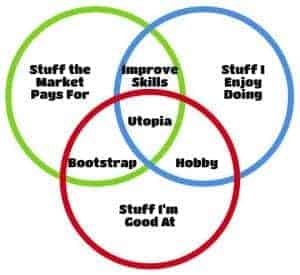
After some careful self-examination, create a list of unique blog ideas that overlap with what you’re good at and what you enjoy doing. These are the best topics when deciding what you should blog about because they’re sustainable and they have longevity.

Qualify the Subject Matter
Are people actually looking for blogs and other content about your subject matter? This question can’t be glossed over or skipped if you’re trying to create the kind of blog that makes money.
After figuring out a couple niches you’d like to create a blog about, research what people are looking for and buying within those niches. After that, refine your list of possible things you think you should blog about.
Niche selection is easy when you look at what’s popular on websites like Amazon, iTunes, eBay, and Google. They give that kind of insight away for free.
Find similar sites that cater to your niche and identify the most popular content on them. If people are paying for content similar to what you’d like to blog about, that’s a good sign.
Build a Better Product
If it’s ebooks or courses –check out their table of contents and incorporate some of their concepts into your own content ideas.
Read the comments and reviews, too –there’s usually some great nuggets in there, like things the author may not have explained well enough; comments and reviews offer great insight that can help you outperform existing influencers in your niche.

Qualify the Traffic
In order to get a better idea of how many people are seeking out content that relates to the niche you think you should blog about, analyze Google Search traffic to be completely sure that there’s demand.
Everyone tells you to use the Google Keyword Planner, but that’s geared towards making ads. Something like Ahrefs would be better, but when you’re starting out it’s likely too much machine for a beginner.
Instead, download Keywords Everywhere for Chrome (it’s free), and type a few questions, challenges, and problems you’d like to solve –or even some chapter titles from a popular book related to your subject into Google to see what shakes out in terms of search volume.

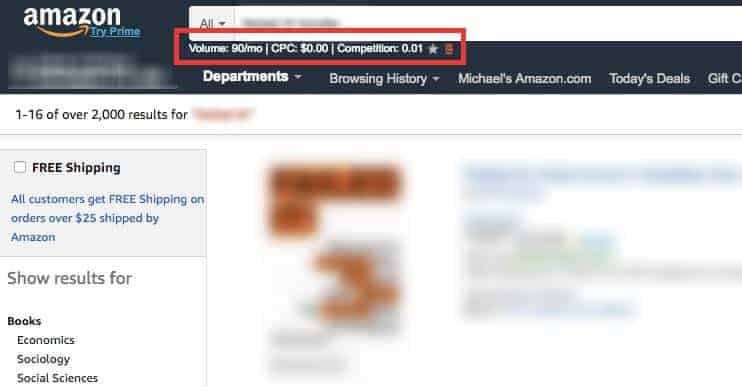
Traffic volume doesn’t need to be insane, as you can see above we’re in a very low traffic niche (how to become a digital nomad). And yet we’re still able to reasonably monetize it.
Sometimes low traffic, low competition niches are the best playgrounds to play in. Enough traffic to serve a human need, low enough traffic that you’re not losing the battle for page one on Google to a giant, influential entity with a marketing budget.
Keywords Everywhere will spit out some traffic numbers within search results pages, show you what monthly traffic volume looks like, and offer suggestions for other related topics.
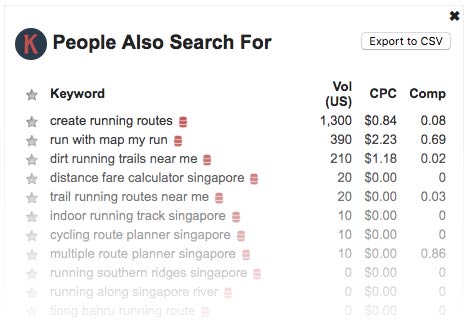
A few key topics will emerge that will form the foundation of your blog content.
This information will help you qualify your idea in the beginning, and then help you choose keywords to use in your blog titles, subtitles, and paragraphs, later on. To learn more about keywords, check out this keyword placement guide to help blogging beginners rank better on search engines.
Keywords Everywhere will also show you some of the nuances of how your audience uses Google, too.


If you’re a blogging beginner, you might prefer to go for lower competition keywords until you build up your rank on search engines. And that’s where this list of our best blogging tools comes in –Keywords Everywhere is a great free tool, but there’s an even better way to identify how competitive it is to rank for a chosen keyword.
But not so fast –so far we’ve only got marketable blog topics and basic keywords. Now it’s time to put it all together.

Add Human Context
Understanding your audience at a deeply personal level will help you hash out your purpose, tone of voice, and help you choose the best keywords. The ones they use when they’re ready for a solution (or make a purchase).
Figuring out how to speak to your audience in a way they find meaningful is how you get the right website traffic, make them feel good, close that deal, or solve their problem.
In other words, you know what keywords to use to attract Google; now it’s time to better understand your audience and put some human context to your content in order to be truly helpful.
Once you’ve figured out what you think you should blog about has value, it’s time to discover how you should communicate your message.
That means understanding what they know about their challenge and how they feel about it –and then framing your solution around these factors in the right context.
This is done by getting familiar with your ideal website visitor, also known as a “buyer persona” or a user group. A buyer persona is marketing speak for who you’re selling to –or speaking to.
People don’t search Google for the cure because they haven’t found that yet; they search for the symptoms. Understand human context and be a better blogger
Pull out a pencil and visualize your audience. If you know exactly who they are you can create content just for them, nurture a loyal following, and be more effective at choosing the keywords you focus on throughout your content.
In a notepad answer the following questions;
- How old are they?
- What gender are they?
- What are the symptoms of the problem they’re trying to solve?
- What are their goals and associated challenges?
- What is their average yearly income?
- What blogs are they currently reading?
- What social channels do they prefer?
- What are their shopping preferences?
- What stage in the “buyer’s journey” are they?
- Where do they stand on niche-related issues?

Understanding the Buyer’s Persona and the Buyer’s Journey
Break up different buyer personas into groups based on their unique challenges within the topics you’ve decided you’d like to focus on, and where they’re at in their buyer’s journey.
For instance, if someone searches “Nike basketball shoes photos” they’re just starting their buyer’s journey. They’re not ready for the solution because they don’t know what they’re specifically looking for yet. They’re exploring.
If they were more specific, like “Nike Air Max shoes price” –that’s an indicator they’re almost done their buyer’s journey and ready for you to provide the solution they’re looking for.
Maybe you want them to find you early on, maybe you’d rather they find you at the end –that’s for you to decide.
Symptom-Related Keywords
In situations I highlighted earlier –going after symptom-related keywords– your prospective audience might not know they need an app like TripMode and might be looking for ways to “restrict background data“. They don’t know off the top they need TripMode to restrict data-hungry apps to lower their mobile data bill, they’re basically asking the universe to show them it exists and why they need it.
Write down a number of symptoms to challenges you will be able to help your audience overcome and then do keyword research on those, too. Symptoms are a fundamental element of what you should blog about for both humans and Google.
Brainstorm how you’ll deliver the right information to your prospective readers at the right time in a way that’s win/win (ie. product suggestions, reviews, online courses, personal coaching, ebook, etc).
Still Stuck on “What Should I Blog About?”
Understanding your unique blog idea from the inside out is how you will become a successful blogger. It’s as much about you as it is your reader. Personal blog ideas often die on the vine because the blogger loses interest, so choose wisely.
To recap;
- Choose a niche you won’t get tired of
- Thoughtfully qualify your idea by looking at available data; search traffic, online purchases, and reviews
- Ensure that people care enough about your niche that they’ll invest in it as much as you do –this will create a reciprocal relationship with your readers and their investment (readership, social shares, correspondence, or purchases) will keep you motivated to invest in it, too

Check Out Our Free Blogging Course!
If you found this post helpful, check out the rest of our free blogging course.
You’ll learn how to start a blog from scratch, make passive income –and much, much more!
Learn Blogging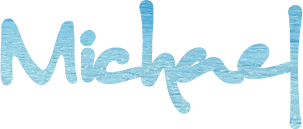
Still don’t know what you should blog about? Leave a question in the comments and we’ll do our best to help you out.




